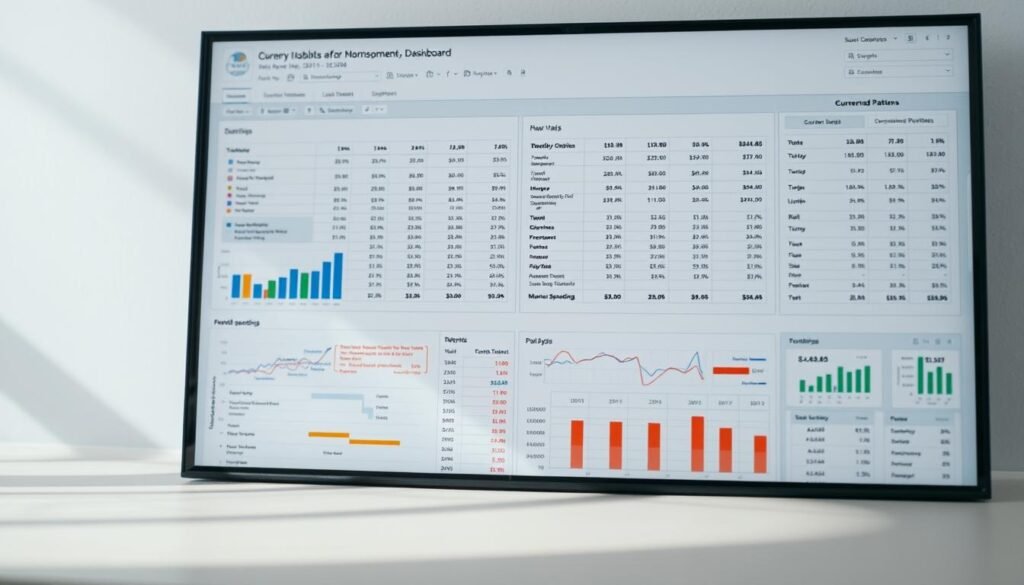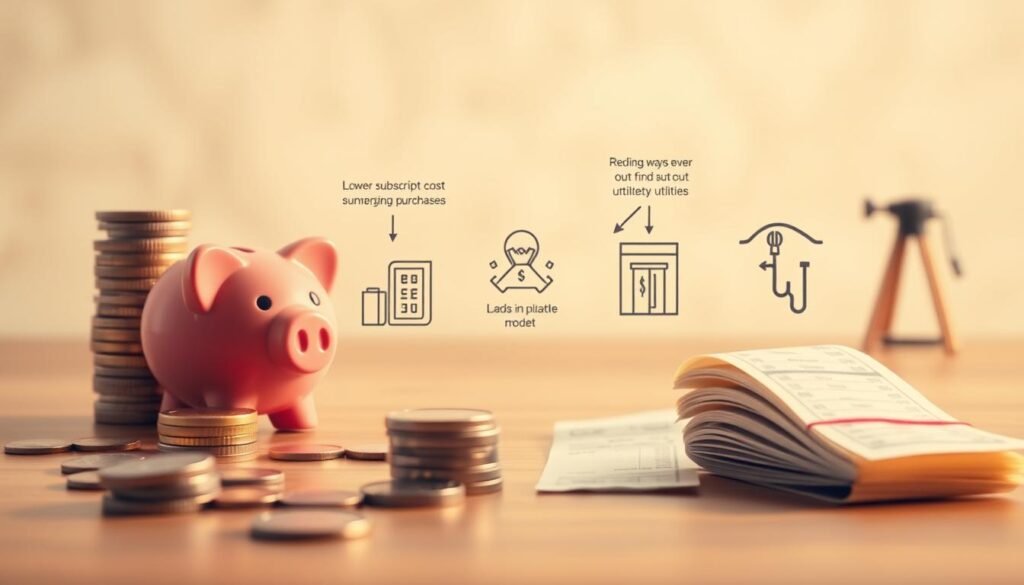Did you know the average American household wastes nearly 30% of their monthly income? That’s money that could be redirected toward savings, debt payoff, or meaningful goals. Learning what to cut from your budget isn’t about sacrifice it’s about alignment.
By identifying expenses that don’t serve your priorities, you can take control of your finances without feeling restricted. It’s not deprivation; it’s smart, values-based spending.
Trimming expenses can actually make your life better. It’s about spending money wisely. This way, budgeting becomes a tool for financial freedom, not just a restriction.
Mindful budgeting lets you spend on what really matters. Maybe it’s saving for a dream trip, investing in yourself, or building an emergency fund. Cutting from your budget can lead to new opportunities.
Key Takeaways
- 30% of household income can be saved through smart budgeting
- Budgeting is about making intentional financial choices
- Reduce costs without sacrificing quality of life
- Transform your financial perspective
- Redirect savings to meaningful personal goals
Understanding Your Current Spending Patterns

Controlling your finances starts with knowing how you spend money. Cutting costs is easier when you see where your money goes each month. Looking closely at your current expenses is key.
Start by tracking every dollar you spend. This helps you see where you can save without giving up too much.
Track Daily Expenses
Keeping track of your daily spending is vital for managing your budget. Here are some ways to do it:
- Keep all receipts in a folder
- Record cash and digital transactions right away
- Use a spreadsheet or app to track expenses
- Check your bank and credit card statements every week
Identify Essential vs Non-Essential Spending
Not all spending is the same. Critical financial cutbacks mean knowing the difference between needs and wants:
- Essential expenses: Rent, utilities, groceries, insurance
- Non-essential expenses: Dining out, subscriptions, entertainment
- Discretionary spending: Shopping, travel, luxury items
Use Budgeting Apps and Tools
Today’s technology makes saving money easier. Many apps help you track spending, set goals, and find ways to save.
Apps like Mint, YNAB (You Need A Budget), and Personal Capital give you insights into your finances. They sort your expenses for you, helping you make smarter spending choices.
Smart Ways to Cut from Your Budget

Want to save money? Learning to spend wisely is key. Cutting your budget doesn’t mean giving up all fun. It’s about choosing wisely to meet your financial goals and values.
Begin by looking closely at your spending. Ask yourself: Which expenses truly enhance my life? Not every cut is the same. Some can really help your finances without hurting your quality of life.
- Prioritize expenses that bring genuine value
- Eliminate subscriptions you rarely use
- Negotiate better rates for essential services
- Explore cost-effective alternatives
Understanding the difference between needs and wants is crucial. Make a spending list that shows what’s most important to you. This way, cutting your budget becomes a smart financial move.
Here are some smart ways to cut your budget:
- Do a monthly expense check
- Set clear financial goals
- Use cash or prepaid cards to limit overspending
- Implement a 24-hour waiting period for non-essential purchases
Good budget management is about building lasting financial habits. By choosing wisely, you can save money and still enjoy life.
Optimize Your Monthly Subscriptions
Reducing spending on subscriptions can cut down your monthly bills. Many people waste money on unused or forgotten services. By managing your recurring payments wisely, you can live more frugally and save money.
First, take a close look at your current subscriptions. Many people have many services without knowing the total cost.
Audit Entertainment Services
Make a list of all your entertainment subscriptions. See which ones you really use and enjoy. Here are ways to cut costs:
- Review streaming platform usage
- Check how often you use each service
- Cancel any duplicate subscriptions
Review Recurring Payments
Look at automatic charges to find hidden costs. Make a detailed list of your monthly payments:
| Payment Type | Monthly Cost | Potential Savings |
|---|---|---|
| Streaming Services | $35 | $15 |
| Software Subscriptions | $25 | $10 |
| Digital Memberships | $20 | $8 |
Find Alternative Solutions
Find smart ways to lower subscription costs:
- Share accounts with family
- Use free trials wisely
- Look for discounts on bundles
- Try free alternatives
By using these tips, you can save money and make your subscription choices more thoughtful.
Reducing Grocery Expenses Without Sacrificing Quality
Reducing grocery costs doesn’t mean you have to give up on quality. You can save money and still eat well. There are many ways to cut down on grocery bills without feeling like you’re missing out.
Meal planning is key to saving money on food. By planning your meals for the week, you avoid buying things on impulse. This helps you only buy what you need, saving you money.
- Create a detailed weekly meal plan
- Make a comprehensive shopping list
- Stick to your list while shopping
- Avoid shopping when hungry
Shopping around for the best prices can also save you a lot. Different stores charge different prices for the same items. Here are some tips to help you save:
| Strategy | Potential Savings |
|---|---|
| Buy generic brands | Up to 30% off |
| Purchase seasonal produce | 20-50% cheaper |
| Use store loyalty programs | 5-10% cashback |
Buying in bulk can save you money, but only for items that don’t spoil. Warehouse stores like Costco offer big discounts on things like rice, beans, and canned goods. Make sure to check the price per unit to really save.
Cooking at home is the best way to save on food. Making meals yourself is usually cheaper and healthier than eating out. Spend some time learning easy, healthy recipes that you can make quickly.
Transform Your Housing and Utility Costs
Reducing your housing and utility costs can cut your monthly spending a lot. Most families spend a big chunk of their budget on these areas. It’s a great place to start saving money and cutting costs.
Energy-Saving Strategies
Lowering energy use doesn’t mean you have to be uncomfortable. There are smart ways to save money and help the planet:
- Upgrade to energy-efficient appliances
- Improve home insulation
- Use programmable thermostats
- Seal air leaks around windows and doors
Housing Alternatives
Looking for new ways to live can lower your costs. Here are some ideas to save on housing:
- Downsize to a smaller living space
- Explore house sharing opportunities
- Negotiate rent with your landlord
- Consider moving to a more affordable neighborhood
Smart Home Management
Use technology to make your home more energy-efficient. Get smart home devices to track and lower energy use. Some ideas include using smart power strips, LED lights, and home automation systems.
By trying these tips, you can make big savings without giving up your lifestyle. Even small changes can add up to big savings over time.
Creative Ways to Save on Entertainment
Downsize spending on entertainment doesn’t mean you have to give up fun. You can have exciting times without spending a lot. Frugal living is about finding smart ways to save money while still enjoying life.
Here are some budget-friendly entertainment ideas:
- Leverage free community events like outdoor concerts and festivals
- Explore local museums during free admission days
- Host potluck game nights with friends
- Use library resources for books, movies, and digital content
- Take advantage of free streaming platform trials
Digital platforms can help you save money on entertainment. Streaming services often have free trials. Sharing subscriptions with family or friends can also save you money. Services like Spotify and Netflix offer discounts for students or groups, helping you enjoy entertainment without breaking the bank.
| Entertainment Option | Average Monthly Cost | Potential Savings |
|---|---|---|
| Traditional Movie Theater | $50-$100 | $0 |
| Streaming Services | $10-$20 | $30-$80 |
| Free Community Events | $0 | $50-$100 |
By using these strategies, you can cut down on entertainment costs. But you don’t have to give up fun. It’s all about being smart with your money.
Transportation and Commuting Savings
Transportation costs can quickly drain your budget. But, smart strategies can help you reduce costs. Your daily commute and vehicle expenses offer many ways to save money.
To manage transportation expenses, you need a multi-pronged approach. This includes using alternative methods, maintaining your vehicle well, and driving smartly.
Alternative Transportation Methods
Exploring different transportation options can lead to big savings:
- Carpooling with colleagues or neighbors
- Using public transit passes
- Cycling for short-distance commutes
- Walking when possible
- Working remotely part-time
Vehicle Maintenance Tips
Proper vehicle care can prevent expensive repairs and improve efficiency:
- Regular oil changes
- Tire rotation and alignment
- Air filter replacements
- Timely brake system checks
Fuel Economy Strategies
| Strategy | Potential Savings |
|---|---|
| Smooth acceleration | Up to 33% fuel savings |
| Maintain steady speed | Up to 25% fuel efficiency |
| Regular tire inflation | 3-5% fuel economy improvement |
Implementing these transportation savings strategies can help you minimize expenses without sacrificing mobility or convenience.
Mindful Shopping and Consumer Habits
Learning to shop mindfully is key in frugal living. To spend less, knowing your buying habits is crucial. Many people buy things to fill emotional gaps or for quick happiness.
To cut costs, try these smart steps:
- Wait 24 hours before buying non-essential items
- Make a shopping list before you go
- Stop getting emails that make you want to buy things on impulse
- Use apps to track your spending
Emotional spending often comes from stress, boredom, or feeling pressured by others. Spotting these triggers lets you find better ways to spend your time. Try free activities like working out, reading, or hanging out with friends instead of shopping.
Adopting minimalism can change how you buy things. Focus on quality, not quantity, to buy less. Before you buy, ask yourself: “Do I really need this?” and “Will it make my life better?”
Here are more ways to shop mindfully:
- Set financial goals for yourself
- Be thankful for what you already have
- Do your homework on purchases
- Compare prices before you buy
Mindful shopping isn’t about giving up. It’s about making choices that fit your budget and values.
Conclusion
Cutting from your budget isn’t about feeling deprived. It’s about making smarter money choices. The strategies you’ve learned help you spend less without losing out on life’s joys.
Every small change you make adds up. It leads you closer to financial freedom. This journey is about making your money work better for you.
Tracking your spending and cutting what you don’t need is key. It helps you save more and grow your finances. Think of your budget as a guide that changes with your life.
The real aim is to have more financial freedom. This freedom lets you pursue your dreams and feel less stressed. Use these tips to build a better financial future for yourself.
Start your financial journey today. With the right plan and commitment, you can change how you spend money. You can save more and feel more secure about your finances. You have the power to shape your financial future.

